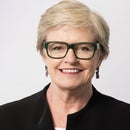Board and governance
Cancer Council Australia

Our Board is responsible for strategic decision and policy-making activities of Cancer Council Australia. The Board comprises
- an independent Chair appointed by the Board
- a nominee from each state and territory member organisation
- three additional nominees, one each from NSW, Queensland and Victoria
- a nominee of the Clinical Oncology Society of Australia
- a nominee who is a consumer.
Board committees
There are three Board committees:
- the Executive Committee consults with the Chief Executive Officer on managerial and other issues delegated by the Board
- the Finance, Risk and Audit Committee oversees the audit of business and operational matters, identifies and manages business risk, and advises on matters relating to financial performance and budget development
- the Governance Committee oversees and advises the Board on issues relating to the current review of the constitution and on other matters relating to governance.
Board members

Professor Maxine Morand AM
Chair

Ms Anne Pleash
Deputy Chair & Consumer Director

Mr Michael Morgan
Cancer Council New South Wales

Ms Patricia Schmidt
Independent Director nominated by Cancer Council Queensland

Ms Jennifer Richter AM
Independent Director nominated by Cancer Council South Aust, Chair, Governance Committee

Distinguished Professor Gregory Peterson
Cancer Council Tasmania

Ms Michele Williams
Cancer Council Victoria

Ms Kathryn Bellion
Cancer Council Victoria

Dr Jo Mitchell PSM
Cancer Council New South Wales

Mr Roger Buckley
Cancer Council Australian Capital Territory

Mr Andrew Arkell
Independent Director nominated by Cancer Council Queensland Chair, Finance Risk & Audit Committee

Dr Paul Cannell
Cancer Council Western Australia

Ms Natasha Fyles
Cancer Council Northern Territory
Governance statement
Cancer Council Australia is a company limited by guarantee, incorporated under the Corporations Act 2001 and the Australian Charities and Not-For-Profits Commission Act 2012. Ultimate responsibility for the governance of the organisation rests with the Board of Directors. The Governance Statement outlines how the Board meets that responsibility. The Board's work is guided by a Board Charter which can be found here:
Achieving the mission
The Board’s primary role is to ensure that Cancer Council Australia's activities are directed towards achieving its mission of minimising the threat of cancer, through successful prevention, best treatment and support. The Board must ensure that this mission is achieved in the most efficient and effective way possible. Our constitution can be viewed here:
Specific responsibilities of the Board
The Board fulfils its primary role by:
- selecting, appointing, guiding and monitoring the performance of the Chief Executive Officer
- formulating Cancer Council Australia's strategic plan in conjunction with the Chief Executive Officer and senior management
- monitoring management's progress in achieving the strategic plan
- approving the organisation's annual budgets and monitoring management's adherence to them
- ensuring the integrity of internal control, risk management and management information systems
- putting in place a suite of delegations, policies and procedures
- ensuring Cancer Council Australia's financial viability, solvency and sustainability
- ensuring stakeholders receive regular reports
- ensuring the organisation complies with relevant legislation and regulations
- acting as an advocate for Cancer Council Australia whenever and wherever possible.
Management's responsibility
The Board has formally delegated responsibility for Cancer Council Australia's operations and administration to its Chief Executive Officer, and his senior management team.
Board oversight
The Board acts collectively as it oversees and monitors management's performance by:
- meeting at least four times during the year
- receiving detailed financial and other reports from management at these meetings
- receiving additional information and input from management when necessary
- assigning to its Executive and its Finance Committees, responsibility to oversee particular aspects of Cancer Council Australia's operations and administration.
Each Board committee operates under separate terms of reference approved by the Board. Other advisory committees report through the Chief Executive Officer to the Board. Their terms of reference are reviewed regularly and updated as necessary.
Board members
All Board members are non-executive directors and receive no remuneration for their service.
The organisation's constitution specifies:
- there must be no more than 11 ordinary member directors
- no employee of the organisation, including the Chief Executive Officer, can be a director of the organisation
- an annual general meeting is held annually and within five months of the Cancer Council Australia end of financial year and is attended by a representative of Cancer Council Australia's eight member bodies
- other Board members include a Chair and a Consumer Director.
Board members are appointed on a representative rather than skills basis. The Chair and Chief Executive Officer oversee the induction process for new Board members.
Board members receive an induction pack on their appointment. Board members’ knowledge of the business is maintained by management representations, visits to Cancer Council Australia's office when possible and other activities as necessary.
Risk management
Through its Finance, Risk and Audit Committee, the Board oversees the establishment and implementation of Cancer Council Australia's risk management system, which is designed to protect the organisation's reputation and manage those risks that might preclude it from achieving its goals.
Management is responsible for establishing and implementing the risk management system, which assesses, monitors and manages operational, financial reporting and compliance risks. While the Board retains responsibility for managing risk, the Finance, Risk and Audit Committee is responsible for monitoring the implementation of and reporting on the risk management system.
Independent advice
The Board and Board Committees may request access to external advice on their responsibilities at any time. The organisation maintains separate relationships with an independent legal firm and an independent firm of accountants and auditors.
Ethical standards and code of conduct
Board members, senior executives and staff are expected to comply with relevant laws and the organisation's codes of conduct, and to act with integrity, compassion, fairness and honesty at all times in all their dealings in pursuing the organisation's mission.
Board and committee members and staff are made aware of Cancer Council Australia's ethical standards and code of conduct, and provided with copies of relevant documentation, during their induction.
In the performance of their duties, Board members of Cancer Council Australia are required to adopt the highest standards of personal and professional behaviour. When meeting as the Board, directors must always act in the best interests of Cancer Council Australia.
The Board’s code of conduct requires directors to declare any financial, personal or professional conflict of interest at each meeting of the Board and to abstain from voting on any motion about which there is a conflict.
During and after their terms, all directors have a duty to maintain the confidentiality, integrity and security of official information for which they are responsible or come to learn of during their directorship, and to avoid any activity that may be likely to harm the reputation of the organisation or its member bodies.
Involving stakeholders
Apart from its eight member Cancer Councils across Australia, Cancer Council Australia has many stakeholders, including cancer patients and their carers, cancer professionals, other non-profit organisations, advisory committees, corporate partners, staff, government and the general public.
Cancer Council Australia adopts a consultative approach in dealing with its stakeholders in its activities and especially in the development of its policies and position statements.
Every day, we support people affected by cancer when they need it most
